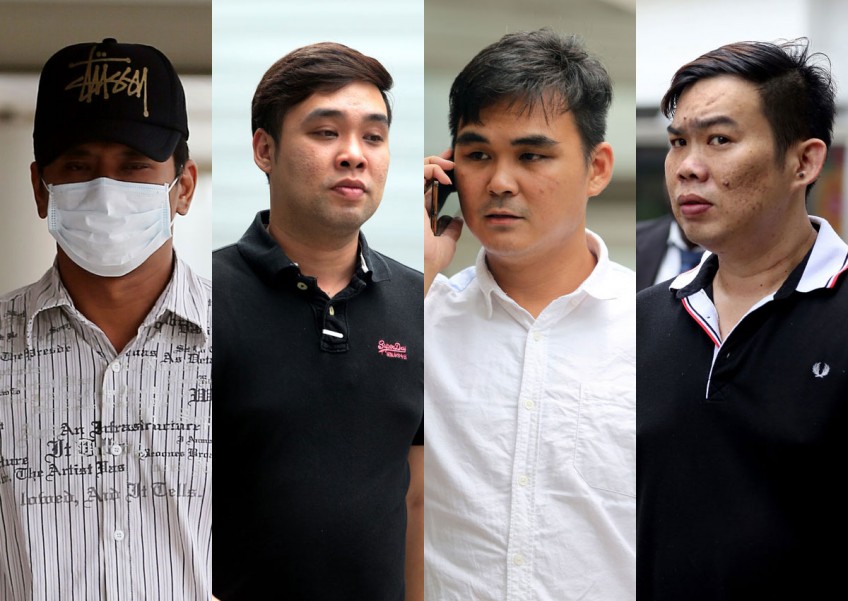Brazen fraud, thuggish behaviour in Mobile Air case: DPP

The prosecution yesterday pressed for stiff sentences to be meted out to four salesmen from a Sim Lim Square mobile phone shop, who admitted to conspiring to cheat customers.
Deputy Public Prosecutor (DPP) Eunice Lim, together with DPPs Charis Low and Victoria Ting, said the case had cast a shadow and brought disrepute to the integrity and reputation of Singapore's tourism and retail industries.
"This is a brazen case of cheating of shocking notoriety," said Ms Lim in her address on sentence following guilty pleas by the four freelance sales executives of Mobile Air, where a Vietnamese tourist had begged for a refund.
Koh Guan Seng, 38, who faced 15 charges of abetment by conspiracy to cheat walk-in customers of $9,789, admitted to six counts. Kam Kok Keong, 31, whose nine charges amounted to $5,860, pleaded guilty to four charges, while Lim Hong Ching, 34, and Kelvin Lim Zhi Wei, 32, admitted to two charges and one charge respectively.
The prosecution is asking the court to impose four to five months' jail per charge.
The men's alleged accomplice, Jover Chew Chiew Loon, 33, owner of the now-defunct store, will have his case mentioned on Oct 28.
DPP Lim said the business model employed by Mobile Air's salesmen constituted a serious violation of corporate integrity.
They operated in a firm registered with the Accounting and Corporate Regulatory Authority and assumed the guise of a legitimate retailer, strategically located in a large and popular mall selling consumer electronic goods.
This facade of legitimacy, she said, extended to structuring transactions to include the use of signed written agreements, to mislead customers.
The salesmen offered popular mobile phone models at bargain prices and lulled unsuspecting victims into a sense of security, making them believe that the documents they signed were part of a normal and genuine transaction.
"In fact, the accused persons either misrepresented the content of warranty agreements to induce customers to sign, or altered the various documents after customers had signed them, in order to use the documents as a basis to demand additional payments," she said.
The signed written agreements bolstered their demands when they were confronted by the police and Consumers Association of Singapore, or when claims were brought before the Small Claims Tribunal.
It was obvious, she said, that the seemingly objective documentary evidence, which was in fact faked, helped disguise the salesmen's scams as contractual disputes.
Emboldened by this, the accused persons challenged customers to lodge reports or even sue Mobile Air.
"Such thuggish behaviour exploits the sale-of-goods transactions and inverts the function of written agreements, which are meant to provide certainty and clarity to commercial transactions, and must be categorically denounced," she said.
Other aggravating factors cited include the fact that most of the victims were foreigners, low-wage daily-rated workers with limited understanding of the English language, consumer rights and the avenues of seeking recourse.
Ms Lim said there was deep public disquiet and the matter captured the attention of mainstream media here as well as internationally.
"There is a particular public interest in discouraging such errant retail practices and safeguarding the trustworthiness of day-to-day transactions premised on oral representations leading to the delivery of money," she said, adding that society expects, if not demands, a high level of honesty from retailers.
The total amount involved for the four accused is $16,149.
Koh's lawyer Edmund Wong said his client did not understand that it was cheating at first, but when he did, he felt indebted to Chew who had loaned him a substantial amount of money. Koh, who is divorced, asked Chew to stop, but this fell on deaf ears.
The lawyer for the other men, Mr K. Jayakumar Naidu, said his clients were mere freelance employees and acted on Chew's instructions.
District Judge Toh Yung Cheong adjourned the case to Oct 14.
The maximum penalty for the offence is 10 years' jail and a fine.
elena@sph.com.sg

This article was first published on October 2, 2015.
Get a copy of The Straits Times or go to straitstimes.com for more stories.